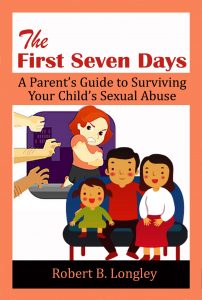There was a recent article about child sexual abuse which had a good description of what to talk to your kids about how and when to discuss sexual abuse with your children. http://www.nymetroparents.com/article/tips-on-how-and-when-to-talk-to-your-children-about-sexual-abuse
Unplanned Disclosure
For 90%+ of parents out there, this may be all they need. For a small group of parents, an exercise in sexual abuse prevention may turn into an unplanned disclosure. It’s one thing to have a plan for preventing your worst fears, it’s something different to realize them in the process. It becomes especially difficult because in almost all cases, the situation violates the rules of trust you have in your life. We are predisposed to trust parents, grandparents, cousins, siblings, baby sitter, teachers, religious figures, and social leaders. Unfortunately this covers almost all of the relationships that abusers fall into. As a parent, finding out that someone in your life that you trust is sexually abusing your child is probably one step below finding out that person can levitate or is actually an alien from another planet. The later two would actually be easier to hear, but based on everything you know about this person there is no way that this should be true. Humans have difficulty processing this type of information. In many cases the brain simply says “lets just go with what we know to be true” and people essentially forget what they have just seen and heard. It’s trauma, and it does funny things to the brain. I’m not a psychiatrist so I’m over simplifying, but there are plenty of examples of women walking in on their husbands/fathers/etc. abusing a child and essentially being told “you didn’t see anything” and they go back to what they were doing. If you don’t believe how susceptible people are to suggestion watch some video’s of Darren Brown on youtube. He’s a British hypnotist that has a TV show where they do crazy things to people in public. In one episode he walks up to people in a resort town and starts asking for directions, starts a conversation and starts asking for their keys, wallets, etc. and they willingly hand it over and he walks away. At least this is fun to watch.
The Triangle of Trust
Almost all child sexual abuse situations have a triangle of trust. Mommy trusts this person – you trust mommy – so you should trust this person. Breaking this trust does things to the brain of the victim as well. The brain can’t handle the event so it sort of switches into “this isn’t happening mode”. They can develop dis-associative behavior to deal with the abuse. Volumes have been written on the subject. The important thing for parents is to be able deal with the fact that by the time they find out, in most cases it isn’t the first time. It’s been going on for months or in some cases years. How can this be? This brings us back to the triangle. Your child doesn’t want to break the triangle of trust so they just keep it to themselves. Its hard to accept, but this is how it plays out for almost every parent who finds out about their child’s abuse. Just know that as incredible as this may sound, it’s true.
Could they be making this up?
Almost every parent will have a moment where they question if their child is making this up. Kids are experts at make believe. They can be gladiators, princesses, and astronauts with a couple of household items. Also lots of them have imaginary friends. Why is this different? Research has shown that it’s simply not something that children make up stories about. It’s a subject that is generally beyond their imaginary experience so it generally can’t come from there. In the rare instance that a child is making something up, it’s usually in divorce cases where one parent plants ideas to regain custody. Bottom line is you need to believe even when you can’t.
Your own trauma
While you may be focused on your child, you are experiencing your own traumatic event with your child’s disclosure. They have already figured out a coping mechanism, but you haven’t. Their coping mechanism might be ultimately counter productive, but there will be plenty of time to work on that. Your mission is to get your child through this important phase. Try to stay strong knowing that your stress level has just been cranked to 11. Others have gotten through this, and you can too. It’s all going to take time.
That first step
You’ve got a call to make. It probably involves making a decision to turn in someone close to you to the police. Some people will simply try to remove their child from the situation, but it will just happen to someone else. Your child is probably not the first victim, and if something isn’t done, they won’t be the last. You may be feeling embarrassed that you didn’t see what is going on. You may feel betrayed. And you may have to make a choice between your child and someone else you know/love/care about. Your world has already changed. You can’t put the genie back in the bottle. At this point you have a few options. All state’s have a child abuse and neglect hotline. If a child is in potential danger, I would recommend this as a first choice. If you feel you may also be in danger, your local police may be the place to start. Both will interact with the other as needed. If safety issues are not your first concern, you may want to start with your local child advocacy center. There are locations listed at the link below. They provide a safe comfortable environment for your child to make disclosure and see a variety of professionals. They can also start you on a path to dealing with the sexual abuse as a non-offending parent. Make your choice, and make the call.
Let us know if we can help you dealing with your family’s sexual abuse situation. For ideas to get started please check out our book on what to do during the early days after disclosure.

